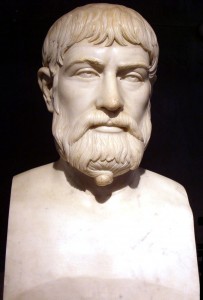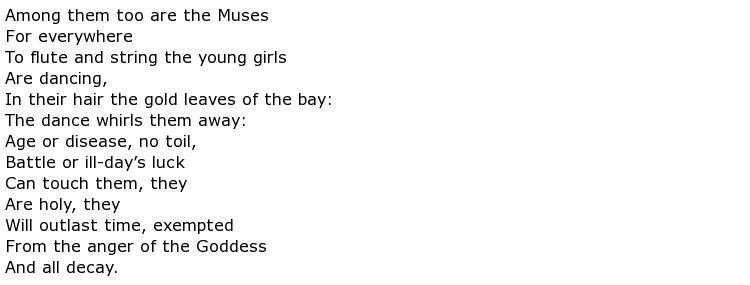 Born around 522BC, Pindar was one of the great lyric poets of Greece, and is also seen as one of the more challenging. His poetry is often difficult to read and many readers, including literary scholars, over the years have struggled with the quirks and idiosyncrasies his verse contains.
Born around 522BC, Pindar was one of the great lyric poets of Greece, and is also seen as one of the more challenging. His poetry is often difficult to read and many readers, including literary scholars, over the years have struggled with the quirks and idiosyncrasies his verse contains.
Pindar was brought up in a village not far from Thebes and rumor had it that he was stung on the tongue by a bee in his youth, which was supposed to have given rise to his talent and poetry dipped in honey. He would become one of the most successful poets of the time and details of his life have been gleaned from various manuscripts discovered long after his death.
Indeed, by the time he was 20, Pindar was already known as an accomplished poet and was asked by a prominent family to produce a celebratory ode for them. Various historical sources state that he studied the art and structure of poetry in Athens. He lived in an uncertain time with invasions from Persia that included battles such as that at Plataea where many of the aristocrats of Thebes were killed. It was also the time of the Olympic Games.
He was responsible for writing a number of victory odes as commissions from a number of high born families over his lifetime and it allowed him to travel across Greece. Whilst these were politically perilous times, Pindar was never shy of expressing his own views and it didn’t seem to do him any harm.
Pindar has a large number of works accredited to his name, among these choral pieces, including paeans, or songs of praise, and hymns that were sung at religious festivals at the time. He would wrote many odes to athletes competing at the games which were popular in Ancient Greece. The most famous of these works are Olympian Ode 1 and Pythian Ode 1.

Olympian Ode 1 is a celebration of the victory of Hieron, in a race on horseback, during the games of 476BC. It praises the Syracusian tyrant for his wealth and athletic prowess. A lyric poem of 116 lines, it includes the ancient myth surrounding Pelops, the king of Pisa and the mythic origins of the Olympic Games. Pythian Ode 1 also exalts Hieron but this time in a chariot race. It is generally thought that such an ode would have been commissioned by a member of Hieron’s family and would have been performed as the victor rode back into his home town.
His odes generally follow the same pattern and Pindar is often criticized for not bringing anything new, poetically, to the table. They normally start with invocations to the gods of the time, followed by lines of verse that praise the hero of the piece and his family. Pindar then includes a story from the myths of the time that takes up most of the poem, aligning this with the prowess of the victor.

Of all the poets of Ancient Greece, Pindar’s work has survived the most completely into the modern age. In his later year, success as a poet led him into politics and he is thought to have moved to a place near Alcmaeon, an oracle of the time. He died somewhere around 440BC when he would have been nearly 80 years old.

